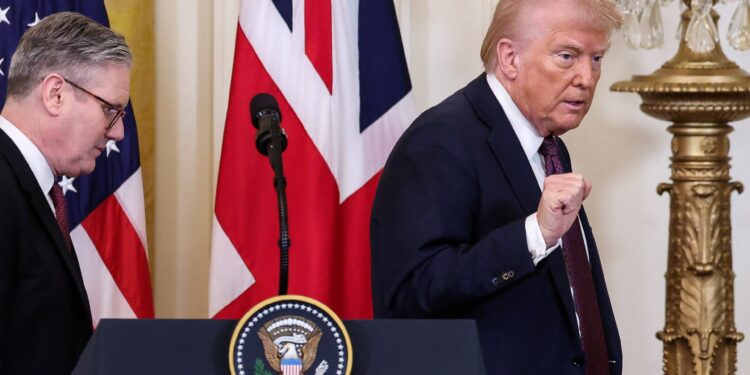The financial hurricane left by US President Donald Trump’s decisions regarding comprehensive customs duties sparked a wave of anxiety in global markets that prompted many to compare it to the “chaos” caused by the catastrophic miniature budget declaration of former British Prime Minister Liz Tarch 3 years ago, according to the Financial Times.
While the markets overthrew a terrace in just 7 weeks, Trump’s influence appears much more dangerous and deeper due to the size and position of the American economy in the global financial system, the newspaper says.
The American president – who was looking at his return to the White House as a catalyst for growth and reduction in taxes and bureaucracy – is now a source of panic for markets, investors and legislators alike.
Anxiety about the disintegration of the global financial system
“The current Trump administration is adopting a national economic vision and uses tools such as customs duties to achieve geopolitical goals,” said Lisa Kest, partner at Oliver Wayman, who specializes in government institutions affairs.
Kwaist indicated a study conducted by its organization in cooperation with the World Economic Forum, which expected that the disintegration of the global financial system would lead to annual losses in the economic product ranging between 600 billion dollars and 5.7 trillion dollars, equivalent to 5% of the global product, which is the twice the damage caused by the Corona epidemic in 2020.
She said, “The problem is not only in the direct economic cost, but in the lack of confidence. These markets are based on stability and confidence, and the loss of this basis will lead to an additional additional cost.”
Capital escape and loss of confidence
The American markets recently witnessed a sharp decline in stock prices and wide sale operations in the treasury bond market, as well as the decline in the value of the dollar, in a clear indication of the loss of investor confidence and the increasing movement of capital exit.
“I am concerned about the United States losing its position as a safe haven due to political turmoil and economic divisions,” said Jimmy Damon, CEO of GB Morgan Chase.
On the other hand, companies’ fears of a hostile political environment are increasing, especially after Trump targeted the law firms representing his political opponents, launching investigations against diversity policies in companies, and cutting funding for prominent universities such as Harvard.
“Customers live in a state of fear of revenge, there is a wide hesitation in making investment decisions, the boards of directors are afraid to become goals for political decisions,” said Anna Benedo, a lawyer for financial markets at Mayer Brown.
Warnings from a future financial crisis
Despite the steadfastness of the financial system in front of major crises such as the Corona and the energy crisis after the Russian war of Ukrainian, experts and observers see that the regime is still fragile to shocks, especially in light of the continued levels of high debt.
Among those risks is what is known as the “gap trade”, as hedge funds use huge amounts of profit from the slight differences between cash bonds and futures.
The Standard & Poor’s classification agency indicated in a report issued last April that any defect in this mechanism “will bounce on the total financial system and suddenly raise the cost of financing,” according to the newspaper.
In a related context, Pierre Olivier Gornshas, the chief economist of the International Monetary Fund, warned that the potential trade war, along with military conflicts in Ukraine and the Middle East, may add escalating pressure on the financial markets, noting that the global economy growth expectations are reduced from 3.3 to 2.8%.
Cut the financing lines in dollars
One of the most dangerous concerns that the newspaper shed light on is the possibility that Trump prevents the federal reserve from providing liquidity in dollars to central banks around the world through currency exchange lines, which represented a major rescue tool in previous crises.
“There are no indications so far on the federal intention to stop these lines, but if that happens, it will be very dangerous,” said Andreas Dumbert, former CEO of the Central Bank of the Central Bank.
Who is the winner?
Despite Trump’s attempt to reshape the global economic system to serve US interests, experts warn that the collapse of the global financial organization – such as the “Basel” banking system – may give China a great advantage.
“If the Basel regime collapses, the major Chinese banks will be the candidate for hegemony, especially as they are supported by the state and can work with lower capital, and this is not in the interest of Washington or London, but it serves Beijing,” said Sir Paul Taker, former Deputy Bank of England Governor, said.



